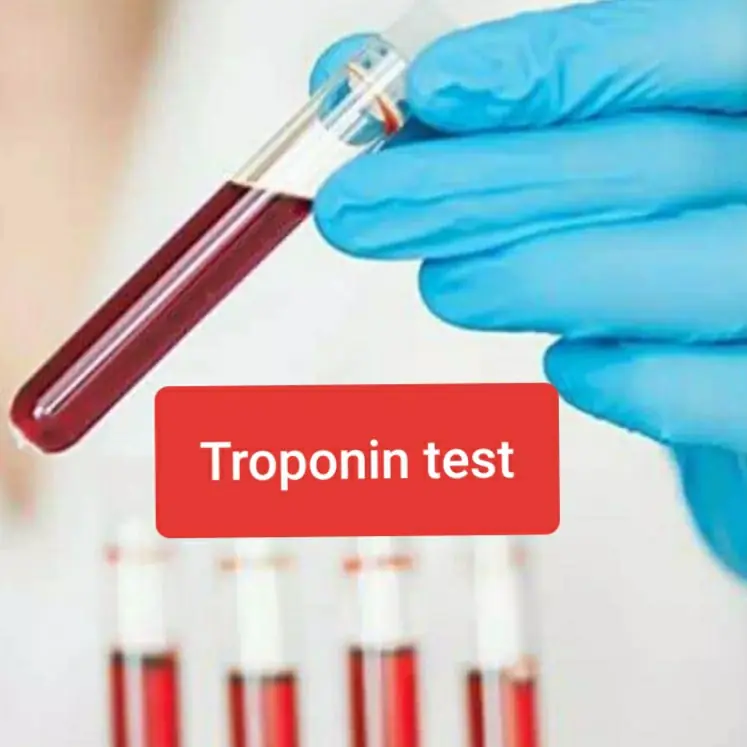🏾 Contents:
- What is troponin ?
- Troponin test
- What is the normal troponin level?
- Interpretation of results
- High Sensitivity Cardiac Troponin
- What other tests could I have with this test?
- Toponin and pregnancy
🏾 What is troponin ?
Troponin is a protein found in the muscles of the heart. It is a complex of three regulatory proteins (troponin C, troponin I and troponin T) that are integral to muscle contraction.
The troponins l and T, the only ones of interest in cardiology, will be released into the blood if the heart has suffered damage. The presence of these troponins is therefore normally undetectable in the blood.
Physicians often associate troponin with heart attacks, they are widely used as diagnostic and prognostic indicators in the management of myocardial infarction and acute coronary syndrome.
It is measured using a simple blood sample.

🏾 Troponin test
In general, there are no special preparations to make before the analysis, it is a blood test that can be done at any time and does not require fasting, except whether your blood sample will be used for further testing.
Recheck troponin levels one or more times over a 24-hour period to look for changing levels over time may be needed for patients being evaluated for a heart attack
🏾 What is the normal value of troponin ?
Laboratories measure the amount of troponin protein in your blood. The results of the analysis are expressed in nanograms per milliliter of blood (ng/mL) or per liter (ng/L).
Although "normal" troponin levels vary from lab to lab, it is generally accepted that a value below 0.04 ng/ml is normal.
- Normal: 0 – 0.04 ng/ml
- If the result is between 0.04 - 0.39 ng/ml, this often indicates a heart problem, so it is important to see a doctor to look for other symptoms and order other tests before making a diagnosis.
- High: Above 0.40 ng/ml
Note: The reference value for the troponin test varies by lab and the type of test performed, so you should consult your doctor to discuss this.
🏾 Results interpretation
High Troponin
◾ Even a low level of troponin is detected in your blood, it may mean that your heart is damaged. The increase in troponin occurs approximately 4 to 8 hours after the onset of pain and the elevated level of troponins can persist for up to 10 to 14 days after cardiac damage.
An increase in serum troponin is almost always indicative of cardiac involvement. A very large elevation is usually suggestive of an acute myocardial infarction.
◾ Other reasons for higher than normal troponin levels include:
- Kidney failure or chronic kidney disease
- Pulmonary embolism
- A traumatic injury to the heart, such as a sudden hard blow to the chest
- Toxic damage (cardiotoxic chemotherapy, drug intoxication, etc.).
- Severe COVID-19
- Sepsis
- Severe arrhythmia, severe anemia.
Test results may vary depending on your age, gender, medical history, test method used and other factors. The doctor may look for other symptoms and order other tests before making a diagnosis.
Note: Having this test too soon after a heart attack can result in a false negative.
🏾 High Sensitivity Cardiac Troponin
Several generations of the troponin test have been developed to provide more accurate and reliable results of troponin blood levels for faster and more accurate detection of heart attacks.
The High Sensitivity Cardiac Troponin is a newer type of test that can detect lower levels of troponin. This can help diagnose heart damage and acute coronary syndrome earlier.
Nevertheless the interpretation of troponin HS in terms of specificity is still debatable more than for the classic assay, many clinical situations of origin non-ischemic increase the serum level of the biomarker
Normal levels of high sensitivity cardiac troponin, according to systems, published by The National Institute for Health and Care Excellence
🏾 What other tests could I have with this test?
Other tests that may be needed in addition to the troponin test:
- Electrocardiography (ECG) and echocardiogram.
- Determination of creatine kinase (CPK) and creatine kinase-MB (CK-MB).
- Myoglobin assay
- Copeptin assay
🏾 Is troponin elevated during pregnancy?
Only the dosage of serum troponin I remains unchanged during of pregnancy and childbirth, and is therefore a good marker for the diagnosis of IDM during pregnancy. But troponin I can also be elevated in hypertensive disorders of pregnancy and pre-eclampsia.
Reference
- Rochester U - Troponin
- Troponin I in the diagnosis of acute myocardial infarction in pregnancy, labor, and post partum
- A cautionary tale—false-positive troponin I in pregnancy
- National Library of Medicine - Troponin Test
- nice - High-sensitivity troponin tests for the early rule out of NSTEMI
- AACC - First High-Sensitivity Troponin Test Cleared for Use in the U.S.
- Dominique Chassard - Comment prendre en charge une femme enceinte porteuse d’une coronaropathie ?
- Dr C. GAST - sfmu : Les biomarqueurs de l’infarctus du myocarde